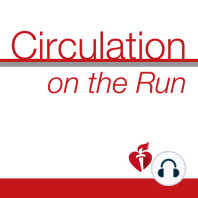17 min listen
Circulation March 15, 2022 Issue
ratings:
Length:
28 minutes
Released:
Mar 14, 2022
Format:
Podcast episode
Description
This week, join author Tristram Bahnson and Associate Editor Changsheng Ma as they discuss the article "Association Between Age and Outcomes of Catheter Ablation Versus Medical Therapy for Atrial Fibrillation: Results from the CABANA Trial." Dr. Carolyn Lam: Welcome to Circulation On The Run, your weekly podcast summary and backstage pass to the journal and its editors. We're your co-hosts. I'm Dr. Carolyn Lam, Associate Editor from the National Heart Center and Duke National University of Singapore. Dr. Greg Hundley: And I'm Dr. Greg Hundley, Associate Editor, Director of the Poly Heart Center at VCU Health in Richmond, Virginia. Dr. Carolyn Lam: Guess what, Greg? For today's feature paper, we are going to be looking at a very interesting analysis from the CABANA trial, this time, looking at the association between age and outcomes of catheter ablation versus medical therapy for atrial fibrillation. Cool, huh? Okay, but first, let's go through some other important papers in today's issue. Why don't I let you go first? Dr. Greg Hundley: Well, Carolyn, my first paper pertains to the cost effectiveness of coronary artery bypass surgery, and it comes to us from the STICH trial. Dr. Carolyn Lam: Ah, very important question, but please remind us what the STICH trial is again. Dr. Greg Hundley: Right, Carolyn. So the Surgical Treatment for Ischemic Heart Failure trial, or STICH demonstrated that coronary artery bypass grafting reduced all-cause mortality rates out to 10 years compared with medical therapy alone in patients with ischemic cardiomyopathy and reduced left ventricular function, defined as an ejection fraction of less than or equal to 35%. Now in this study, the authors led by Dr. Derek Chew at University of Calgary examined the economic implications of these results using a decision-analytic patient-level simulation model to estimate the lifetime costs and benefits of CABG versus medical therapy alone, using patient-level resource use and clinical data collected from the STICH trial. Dr. Carolyn Lam: Again, really important study. And what did they find? Dr. Greg Hundley: Right, Carolyn. So first, using their patient-level simulation model incorporating resource use and clinical data collected from the STICH trial, they found that coronary artery bypass grafting was estimated to cost $63,989 per quality-adjusted life year gain compared to medical therapy alone. Second, in STICH eligible patients with left ventricular ejection fraction of less than 35% in coronary artery disease amenable to CABG, routine use of CABG increased the quality-adjusted life expectancy compared to medical therapy alone for an increased cost within current benchmarks for good value in healthcare within the United States. Then finally, Carolyn, together with the improved clinical outcomes seen in the 10 year extended follow-up of STICH, the findings in this study provide additional economic support for the use of coronary artery bypass grafting in patients with ischemic cardiomyopathy eligible for STICH. Dr. Carolyn Lam: Wow, thanks Greg. Well, this next study contributes to the understanding of the effect of lifestyle and genetic risk on the lifetime risk of coronary heart disease. Interesting? Well, listen up. This is from Dr. deVries from UT Health Science Center at Houston and colleagues who aimed to quantify remaining lifetime risk and years free of coronary heart disease according to polygenic risk and the AHA's Life's Simple 7 guidelines in the population base cohort of ARIC. As a reminder, the Life's Simple 7 by the AHA consists of smoking status, body weight, total cholesterol, blood glucose, blood pressure, physical activity, and diet. Dr. Greg Hundley: Ah, Carolyn. So genes versus lifestyle. So what did they find? Dr. Carolyn Lam: Participants with high polygenic risk may offset their lifetime risk of coronary heart disease by up to 50% through managing their health according to the Life's Simple 7's recommendations, depending on ancest
Released:
Mar 14, 2022
Format:
Podcast episode
Titles in the series (100)
Circulation January 24, 2017 Issue: Circulation Weekly: Your Weekly Summary & Backstage Pass To The Journal by Circulation on the Run
